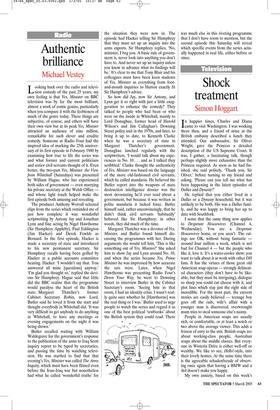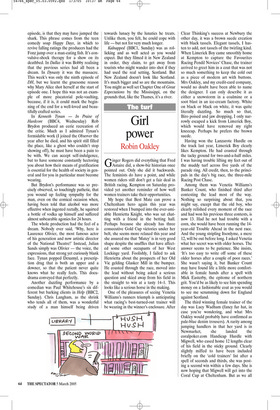Shock treatment
Simon Hoggart
In happier times, Charles and Diana came to visit Washington. I was working there then, and a friend of mine at the British embassy described a lunch they attended. Our ambassador, Sir Oliver Wright, gave the Princess a detailed description of the US Supreme Court. It was, I gather, a fascinating talk, though perhaps slightly more exhaustive than the Princess required. As soon as he had finished, she said politely, ‘Thank you, Sir Oliver,’ before turning to my friend and asking, ‘Please can you tell me what has been happening in the latest episodes of Dallas and Dynasty?’ He replied that you either lived in a Dallas or a Dynasty household, but it was unlikely to be both. His was a Dallas family, and he was happy to bring her up to date with Southfork.
I sense that the same thing now applies to Desperate Housewives (Channel 4, Wednesday). You are a Desperate Housewives home, or you aren’t. The ratings are OK, without being fantastic around four million a week, which is not bad for Channel 4 — but the people who like it, love it. It’s a water-cooler show; you want to talk about it at work with other DH fans. It has the virtues of those great old American soap operas — strongly delineated characters (they don’t have to be likeable, but they must be intriguing), dialogue so sharp you could cut cheese with it, and plot lines which stay just the right side of incredible. For the most part, the current stories are easily believed — teenage boy goes off the rails, wife’s affair with a younger man is discovered, overwrought mum tries to steal someone else’s nanny.
People in American soaps are usually rich, or comfortable, or at least a notch or two above the average viewer. This adds a frisson of envy to the mix. British soaps are about working-class people, Australian soaps about the middle classes. But everyone in Wisteria Drive is either well-off or wealthy. We like to see, Hello!-style, into their lovely homes. At the same time there is the agreeable schadenfreude of observing once again that having a BMW and a 4x4 doesn’t make you happy.
My own anxiety, based on this week’s episode, is that they may have jumped the shark. This phrase comes from the teen comedy soap Happy Days, in which to revive falling ratings the producers had the Fonz jump over a man-eating fish. It’s convulsive-shock therapy for a show on its deathbed. In Dallas it was Bobby realising that the previous series had all been a dream. In Dynasty it was the massacre. This week’s was only the ninth episode of DH, but we learnt the gruesome reason why Mary Alice shot herself at the start of episode one. I hope this was not an example of more piscatorial pole-vaulting, because, if it is, it could mark the beginning of the end for a well-loved and beautifully crafted series.
In Kenneth Tynan — In Praise of Hardcore (BBC4, Wednesday) Rob Brydon produced an eerie recreation of the critic. Much as I admired Tynan’s formidable work (I joined the Observer the year after he died, and his spirit still filled the place, like a ghost who couldn’t stop showing off), he must have been a pain to be with. We can accept self-indulgence, but to have someone constantly hectoring you about how their means of gratification is essential for the health of society in general and for you in particular must become wearing.
But Brydon’s performance was so precisely observed, so touchingly pathetic, that you wound up feeling sympathy for the man, even on the comical occasion when, having been told that alcohol was more effective when ingested rectally, he squirted a bottle of vodka up himself and suffered almost unbearable agonies for 24 hours.
The whole production had the feel of a dream. Nobody ever said, ‘Why, here is Laurence Olivier, the most famous actor of his generation and now artistic director of the National Theatre!’ Instead, Julian Sands simply was Olivier — the voice, the expressions, that strong yet curiously blank face. Tynan popped Dexamyl, a prescription drug that is both an upper and a downer, so that the patient never quite knows what he really feels. This docudrama conveyed that perfectly.
Another dazzling performance by a comedian was Paul Whitehouse’s six different but barking clients in Help (BBC2, Sunday). Chris Langham, as the shrink who tends all of them, was a wonderful study of a man himself being driven towards lunacy by the lunatics he treats. Unlike them, you felt, he could cope with life — but not for very much longer.
Kidnapped (BBC1, Sunday) was as rollicking and as well acted as you would expect. But they filmed it in New Zealand in order, they claim, to get away from tourists who might wander into shot if they had used the real setting, Scotland. But New Zealand doesn’t look like Scotland. It’s much bigger and so are the mountains. You might as well set Chapter One of Great Expectations by the Mississippi, on the grounds that, like the Thames, it’s a river.



























































 Previous page
Previous page